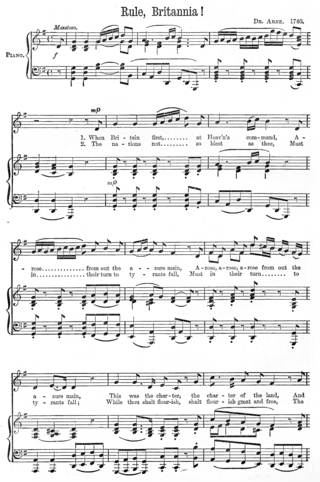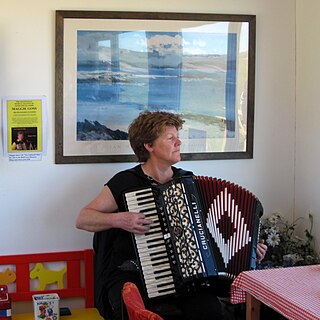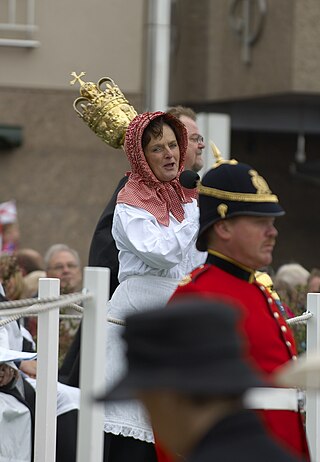
Elysium, otherwise known as the Elysian Fields or Elysian Plains, is a conception of the afterlife that developed over time and was maintained by some Greek religious and philosophical sects and cults. It was initially separated from the Greek underworld – the realm of Hades. Only mortals related to the gods and other heroes could be admitted past the river Styx. Later, the conception of who could enter was expanded to include those chosen by the gods, the righteous, and the heroic. They would remain at the Elysian Fields after death, to live a blessed and happy afterlife, and indulge in whatever they had enjoyed in life.

"Yankee Doodle" is a traditional song and nursery rhyme, the early versions of which predate the Seven Years' War and American Revolutionary War. It is often sung patriotically in the United States today. It is the state anthem of Connecticut. Its Roud Folk Song Index number is 4501.

"Rule, Britannia!" is a British patriotic song, originating from the 1740 poem "Rule, Britannia" by James Thomson and set to music by Thomas Arne in the same year. It is most strongly associated with the Royal Navy, but is also used by the British Army.

The "Londonderry Air" is an Irish air that originated in County Londonderry, first recorded in the nineteenth century. The tune is played as the victory sporting anthem of Northern Ireland at the Commonwealth Games. The song "Danny Boy" written by English lawyer Fred Weatherly uses the tune, with a set of lyrics written in the early 20th century.
Gordon Bok is an American folklorist and singer-songwriter, who grew up in Camden, Maine and is associated with music from New England.

"John Brown's Body" is a United States marching song about the abolitionist John Brown. The song was popular in the Union during the American Civil War. The song arose out of the folk hymn tradition of the American camp meeting movement of the late 18th and early 19th century. According to an 1889 account, the original John Brown lyrics were a collective effort by a group of Union soldiers who were referring both to the famous John Brown and also, humorously, to a Sergeant John Brown of their own battalion. Various other authors have published additional verses or claimed credit for originating the John Brown lyrics and tune.

Ulva is a small island in the Inner Hebrides of Scotland, off the west coast of Mull. It is separated from Mull by a narrow strait, and connected to the neighbouring island of Gometra by a bridge. Much of the island is formed from Cenozoic basalt rocks, which are formed into columns in places.
"My Bonnie Lies over the Ocean", or simply "My Bonnie", is a traditional Scottish folk song that is popular in Western culture. It is listed in Roud Folk Song Index as No. 1422. The song has been recorded by numerous artists since the beginning of the 20th century, and many parody versions also exist.

The culture of the Falkland Islands is essentially analogous to that of British culture. The Falkland Islands have a large non-native born population, mainly white and from England, but also from Saint Helena.
"A Life on the Ocean Wave" is a poem-turned-song by Epes Sargent published in 1838 and set to music by Henry Russell. It is the iconic Regimental March of His Majesty's Royal Marines.
"Sussex by the Sea" is a song written in 1907 by William Ward-Higgs, often considered to be the unofficial county anthem of Sussex. It became well known throughout Sussex and is regularly sung at celebrations throughout the county. It can be heard during many sporting events in the county, during the Sussex bonfire celebrations and it is played by marching bands and Morris dancers across Sussex. It is the adopted song of Brighton & Hove Albion Football Club, Sussex Division Royal Naval Reserve, Sussex Association of Naval Officers and Sussex County Cricket Club.

"Sloop John B" is a Bahamian folk song from Nassau. A transcription was published in 1916 by Richard Le Gallienne, and Carl Sandburg included a version in his The American Songbag in 1927. There have been many recordings of the song since the early 1950s, with variant titles including "I Want to Go Home" and "Wreck of the John B".
"Rolling Down to Old Maui" is a traditional sea song. It expresses the anticipation of the crew of a whaling vessel of its return to Maui after a season of whaling in the Kamchatka Sea.
"Rhode Island’s It For Me" is the regional anthem of the U.S. state of Rhode Island. It was officially adopted as the state song in 1996, replacing "Rhode Island" by T. Clarke Browne, which became the official state march.
The Five Islands Nature Reserve is a protected nature reserve located in the Tasman Sea, off the Illawarra east coast of the state of New South Wales, Australia. The 26-hectare (64-acre) reserve comprises five continental islands that are situated between 0.5 and 3.5 kilometres east of Port Kembla. The Five Islands are Flinders Islet, Bass Islet, Martin Islet, Big Island and Rocky Islet.

The occupation of the Falkland Islands and South Georgia and the South Sandwich Islands was the short-lived Argentine occupation of a group of British islands in the South Atlantic whose sovereignty has long been disputed by Argentina. Until their invasion on 2 April 1982 by the Argentine military junta, they had been governed by the United Kingdom since it re-established control over them in 1833.
"Westering Home" is a traditional Scottish folk song that was written by Hugh S. Roberton in the 1920s. The lyrics of the song talk about the Scottish Island of Islay. It was subsequently adopted as the slow march of the Royal Navy.
"Blow the Wind Southerly" is a traditional English folk song from Northumbria. It tells of a woman desperately hoping for a southerly wind to blow her lover back home over the sea to her. It is Roud number 2619.

Beautiful Jersey or Man Bieau P'tit Jèrri is a Jersey patriotic song, sung in Jèrriais and English. It was composed by an Englishman, Lindsay Lennox, who died in 1906. During the Occupation, islanders would sing the song to keep their spirits up. Today it is performed at Liberation Day and as Jersey's national anthem at some sporting events.










